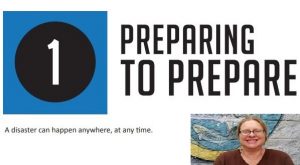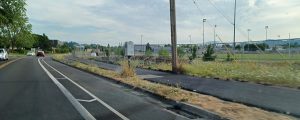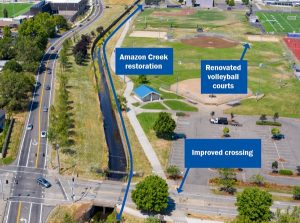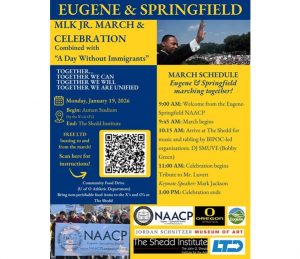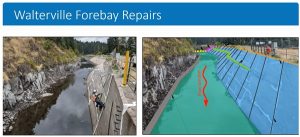Community Supported Shelters takes on 20 more Conestoga Huts, will expand food efforts
10 min read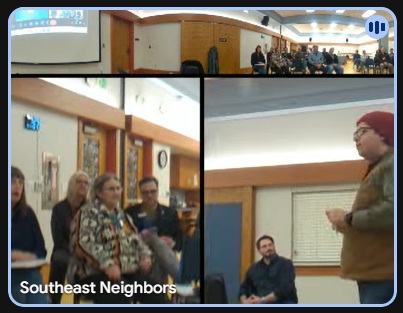
Presenter: Community Supported Shelters adds 20 more Conestoga Huts as it takes on the old Nightingale site, launches a capital campaign, and prepares to offer some staff members their own desks for the very first time. Speaking to Southeast Neighbors Nov. 11, Blake Burrell:
Blake Burrell (Community Supported Shelters): My name is Blake Burrell. So I’m a co-executive director of Community Supported Shelters. My counterpart is Heather Quaas-Annsa. Community Supported Shelters has about 43 employees and 13 properties in the city of Eugene. We do a variety of services for our community.
[00:00:34] So a lot of people recognize us for Conestoga Huts originally created by Community Supported Shelters back in the 2010s. So we’ve been around since 2013, and our organization has gone through a lot of different iterations and evolutions.
[00:00:49] And we have about 250 Conestoga Huts in Lane County. And Conestoga Huts, as a piece of infrastructure, are actually something that’s built all throughout the world. We have places in Australia reach out to us and ask us questions. We had a group come in from Anchorage, Alaska, who wanted to learn about the Conestoga Hut. There’s a safe spot community in a barn somewhere up in Michigan. We’re representing throughout the whole country.
[00:01:13] And our goal is to do what we can do in our community, but then also educate other organizations or groups that want to work on helping folks who are homeless in their communities throughout the country.
[00:01:26] So in our community, we currently have 171 Conestoga Huts. That’s an additional 20 this year with taking on the Nightingale safe spot down in South Eugene. Within those Conestoga Huts, we serve about 250 people for shelter services a year.
[00:01:45] So our goal is to stabilize folks, get them into shelter, identify what their various needs might be, get to know folks. Folks come in from a really diverse set of backgrounds. There’s no one pathway into homelessness. For folks that have experienced homelessness, you know that this is a really complex social challenge and with increasing cost of living or economic challenges that are brought up in different regions such as Eugene, folks can enter into homelessness from things like: medical bills, student loan debt, a family calamity, a divorce. There’s a lot of different things that can lead to someone not being able to pay rent and not being able to pay the bills.
[00:02:29] So a really diverse group of people that come and receive shelter services.
[00:02:34] Our first step in that process is inviting folks to simply come in, check in, and access day services. Our Access Center and Outreach office down on West 11th is a partnership with Trillium and Lane County and now Lane Community Health Council to keep it going.
[00:02:49] We serve about 800 to 900 households a year out of our Access Center, and those are folks that are coming in and signing up for our waiting lists, and then having access to case management, basic services, like getting an ID, applying for a cell phone, doing what’s called a coordinated entry assessment.
[00:03:06] It can actually help someone get on a wait list for housing with Lane County, as well as connect, take showers, do laundry, stabilization, relationship-building.
[00:03:17] After that, if they engage on that wait list, typically that time can be anywhere between four to seven months, depending on just how quickly folks are going through shelter, what rentals are available. It’s really varying on the time of the year.
[00:03:33] So typically, we’re getting to know folks for about six months, helping them stabilize, in some instances a little longer. When they move into shelter, everyone gets access to case management services, a variety of community programming, folks can engage in our workforce development program.
[00:03:49] So we have pre-employment opportunities for folks to start building work experience. And folks that live in our safe spots actually help operate our safe spots. They work in our hospitality teams, our maintenance teams, and our reception teams. And about a third of our workforce are actually folks who are sheltering or have sheltered with us and our employees.
[00:04:11] So our organization puts lived experience at the front. And lived experience leads what we do and how we make decisions as an organization.
[00:04:20] We have a really collaborative team and really engaged board. And I really think we do some amazing work in the community and I’m proud to work with this organization.
[00:04:30] Presenter: Blake said as part of the city of Eugene Shelter Consortium, Community Supported Shelters works very closely with the city of Eugene.
[00:04:39] Blake Burrell (Community Supported Shelters): A majority of our safe spot communities are on city of Eugene Parks land. So we have a lot of different land.
[00:04:47] Some might recognize, if we talk about down at Skinner Farms, so down by Skinner Butte, there was a property that was kind of swampy. It was really hard to garden on. And Parks and Open Spaces was kind enough to open that up and say, ‘Hey, can you all install a sump pump, put up some pathways, would this be a property that works for you?’
[00:05:08] We have a lot of properties that are like that. We also have properties that are in places where there was a high need for unsheltered populations, and folks that were actually establishing encampments in certain areas and safe spot communities became a resource that then helped folks that were unsheltered in that area get more access to services and awareness of what’s available.
[00:05:28] As well as us helping the community take care and tend to those spaces. So we view our relationship with the city of Eugene to be really collaborative. The goal is to take care of folks, to take care of our properties, and to make sure that people have access to those resources.
[00:05:43] We do work with Lane County, all of the money that comes to our region specifically from HUD comes through the county and it gets dispersed either directly to the providers or to the city of Eugene. So we contract with both the city of Eugene and Lane County.
[00:05:58] We work hand-in-hand with folks at Lane County to try to help folks get housed. They do fantastic work in street outreach and making referrals to agencies that have the right resources. So they’ve been a really valuable partner in us getting folks onto housing wait lists and off the streets.
[00:06:15] So that brings us to South Eugene and Nightingale. We started operating the Nightingale Safe Spot in July. So the shelter project closed down for about three months for EWEB to put a water main and actually hook up all the Conestoga Huts on that property to electricity.
[00:06:35] So our Conestoga Huts on that property are all connected or on grid. We have two showers, running water, a kitchen, a common room, and then a storage shed, as well as some nice parking areas and up-and-coming garden project that we’re doing on the west side of the property.
[00:06:53] So in July, we started to move folks in. As we are engaging, we did take this on as an organization, but there wasn’t a major financial allocation for operating the safe spot with us taking it on.
So we’re easing our way in the property. We have about 10 of the Conostoga Huts full right now.
[00:07:11] And our plan is over the course of this year to get a handle on the utilities and just make sure that everything is stable and ease our way into scaling up a property.
[00:07:21] For anyone that’s ever moved in with roommates, moving 20 people in at one time can be really challenging. So we are taking that incremental approach and are looking somewhere by probably about July or August, having 20 folks on that property and seeing what providers in the community are currently impacted by some of the revenue shortfalls at the state level, because we do have some shelter programs that are losing bed capacity and shelter beds of other organizations.
[00:07:51] And that’s been a really big challenge for a lot of my peers who work in shelters and work in outreach and so we may have taken some referrals from some of those shelters that are closing and making sure that everyone has a smooth transition into something new.
[00:08:05] So we have about 10 folks since July. We’ve already housed two people out of the shelter program, which is really exciting. Everyone down there now has access to our housing navigation services, which is something the organization didn’t have the capacity, and now we can offer to folks.
[00:08:22] And everyone either is plugged into our workforce development program or is employed with us. We’re really working on building a community where people can take care of each other and feel really plugged into our organization. And yeah, it’s been really exciting to be in the neighborhood. South Eugene is such gracious hosts. We have so many volunteers and folks from the community who have reached out, said, ‘Hey, how can I participate? How can I support?’
[00:08:50] We have folks that help with our bottle drop program, folks that help with the gardening program, and folks that drop off food or just regular donations. And anything that is dropped off to that safe spot community, we assess and say, do we have the need for this at this safe spot? So if we bring in like clothing or bedwear or pillows or blankets or various things, we’re actually taking those donations and that anything that we don’t have use for there or if we have enough of, we’re taking down to our access center and supporting folks around the shelter.
[00:09:24] So we are in the stage where if there are folks in the neighborhood that want to engage us that are interested in volunteering, interested in donating, we’d love for you to reach out to us.
[00:09:36] We love if someone can come on site and wants to volunteer on site. We love if folks want to come to events. And we do take financial donations. We’re a nonprofit.
[00:09:47] And we’re currently in a capital campaign. So one of our biggest initiatives that the organization is actually moving from our Grant Street location to the old DMV. We’ve purchased the DMV so that we have more space for operations.
[00:10:02] Our co-executive director, Heather, whenever she shares a little bit about our capital campaign. This is the first time that she is actually going to have a desk with our organization because our facilities have been so small.
[00:10:15] So moving to our new property down in West Eugene is going to allow us to have that neighborhood presence down there, as well as have the space to do what we need to do to serve the community better.
[00:10:28] Presenter: Blake was asked if the bottle dropoff program at the Hilyard and 34th site is something they’re planning to restart.
[00:10:35] Blake Burrell (Community Supported Shelters): Yes. Yes, it is. So part of what I shared is that a lot of folks that live on the property are employed or work in the community. So Nightingale historically had someone on gate duty. You can remember that there is usually someone there to open the gate, say hello. Right now most of those folks are at work.
[00:10:51] So what we’ve done is we’ve set up a donation station at the south end of the property so if we’re not there to receive the donation, the blue bin is for blankets, clothing, and books. The brown bin is for bottles and cans. And there’s a little pantry, and we’re working on getting a little library down there if we’ve got any readers.
[00:11:11] And so anyone can bring that down.
[00:11:13] One piece that folks at the community have shared is that sometimes glass bottles could be really hard if they get broken. So they’re right now preferring in a plastic or aluminum. And they’re kind of asking us to do that all back on bringing glass bottles in.
[00:11:30] But if you do, that’s okay. Just be really careful with it. We’ve had folks that have cut their hands on broken glass,
[00:11:36] Presenter: Southeast Neighbor Dennis Hebert:
[00:11:38] Dennis Hebert (Southeast Neighbors): Our former board member Devon Mann and her daughter were the ones that set up a library at Nightingale.
[00:11:46] Blake Burrell (Community Supported Shelters): Oh, great.
[00:11:47] Dennis Hebert (Southeast Neighbors): Are y’all in need of books now or what is your situation?
[00:11:52] Blake Burrell (Community Supported Shelters): I appreciate that. We have some avid readers on the property and the common room is so wonderful and so building on the library would be great. So, I appreciate it, yeah.
[00:12:01] Presenter: A question in the chat: Is the little free pantry accepting donations? Blake Burrell:
[00:12:08] Blake Burrell (Community Supported Shelters): It is. So right on the south end of the property, we’re accepting any food donations, folks check it every evening, and you can get, if no one’s there, you could put it in the little pantry, and that’s right out front.
[00:12:22] If someone is interested and say you’d like to do something on a more consistent basis, like, make sandwiches or things like that, we can actually schedule it. Or we could receive the donation to take it into the kitchen area and put it in the fridges.
[00:12:37] And we just have a sign-up sheet. So we have a couple of days a week that if you have an interest, he said, ‘Hey, this is what I like to cook or prepare, and how frequently I’d be able to do that,’ and we can make that happen.
[00:12:49] There are folks that are losing food stamps. So we’re going to be doing some more broader food efforts across the communities.
[00:12:57] Presenter: Community Supported Shelters adds the former Nightingale site at 34th and Hilyard to its service network, and stands by to provide food and housing to those in need.

